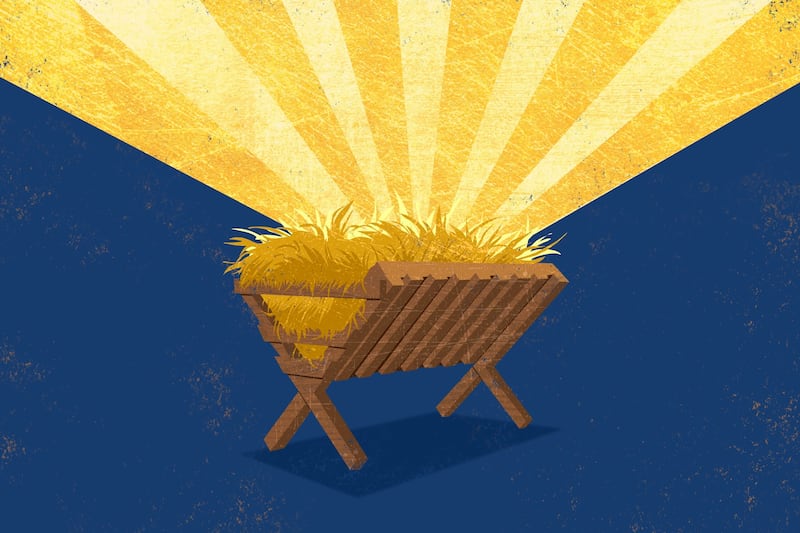I was born in a blizzard in December. My first son came into the world at the close of a January day; his brother, at the end of a December night. I lost their older sibling to miscarriage as the leaves, once red and orange, shriveled and blew away. I knelt in a church as the new year turned and lit a candle and said goodbye. I was baptized, at the age of 35, in the final days of a freezing December. Somehow, for me, birth and death happen in the winter.
There is a sadness to Christmastime, mixed in with the joy. A longing that will never be fulfilled. An aching, yearning nostalgia that is beautiful in its melancholy.
It’s the things that once were — things that were beautiful and will never come again — that get to me. Like standing alone in front of the tree on Christmas morning, taking in the silence of a night just shifting into day — that one crystalline moment before the run down the hall to wake up Mom and Dad. And later, everyone sitting in companionable silence by the fire. The angel chimes dinging in the flickering candlelight. The cold, crisp walk in the snow.
Christmastime can be sad because Christmastime is wonderful. It was made to be that way. It is the birth of the Christ child in the manger and the knowledge that he must die to save us. And we feel that, somehow, in our own celebrations of Christmas: that joy mingling with sorrow. It’s there in the way that each Christmas is like the last, but not quite: a direct line to childhood and the things of yesteryear that, in our busy adult lives, we rarely think about it. It’s happening now but also gone forever. Birth and death. Winter.
This, I think, is why Charles Dickens’s “A Christmas Carol” is so powerful. The miserly Scrooge gets a ticket back in time. He gets to experience the thing we are always trying to recapture at Christmastime: the past. There he stands, right next to it, close enough to touch it. He’s gotten back, if only briefly, the thing we can never have again. And yet in the end it is still for Scrooge as it is for all of us: “These are but shadows of the things that have been.”
For Scrooge, the sadness of Christmas — the birth and death, the transcendent joy and bitter pain — had been too much. He had stepped outside of it entirely. He cut himself off from his fellow man rather than feel the sadness of the things that came before, the things that would never come again. And, in doing that, he refused to allow for other, different Christmases. For more sorrows and more joys. More birth. More death. He held himself apart and thought himself better for it.
The spirits didn’t change anything for Scrooge that fateful Christmas Eve. They didn’t let him go back in time to physically relive his past again. They didn’t let him correct his mistakes or expunge his faults. He emerges Christmas morning the same man he was before — old and alone, his fiancé long gone, his sister dead, his nephew grown up without him. But what the spirits did give him changed everything. They allowed him to tap back in to that cycle of birth and death — the emotional throughline of Christmas. To let back in the melancholy of Christmas that is an indelible part of the joy. The connection to the past that lights up the present. The things that are gone and the things that will come again.
We don’t all get to be visited by three spirits. But perhaps we need to make that Scroogian shift all the same. To find our way back to Christmas present by accepting the Christmases past. If we don’t, we risk checking out. Scrolling on our phones while “playing with” our kids. Letting the phone go to voicemail rather than picking up and speaking to a friend. Going to bed instead of sitting up for a few stolen moments with our spouse. We can only be here, in the present, if we acknowledge that it’s tinged with the pain of the past.
The girl who ran down the hallway to her parents’ door is gone forever, but now she is the mom who waits for the sound of her own kids’ feet pounding down the hall to tell her that it’s Christmas. A longed-for baby is gone, but that candle still burns in the heart of his mother, who found in the loss a spark of belief and was baptized four years later. The triumphant voices of the angels, heralding the arrival of One who was born to die, sing to us down the ages. Birth and death. Death and birth. And joy. A joy so fierce it hurts.
Faith Moore is the author of the novel “Christmas Karol.” She can be found on X at @FaithKMoore or on her website, www.FaithKMoore.com.

